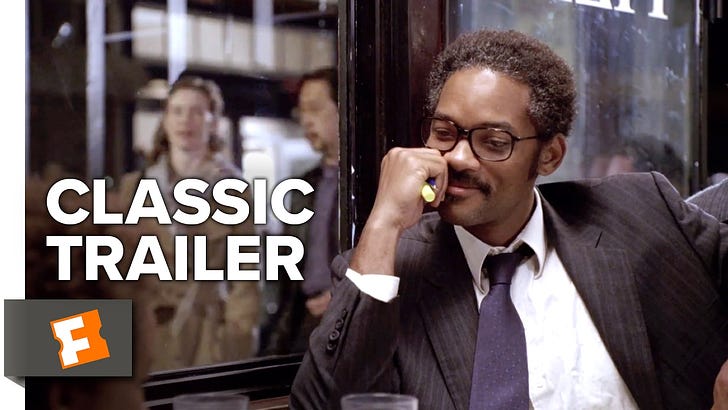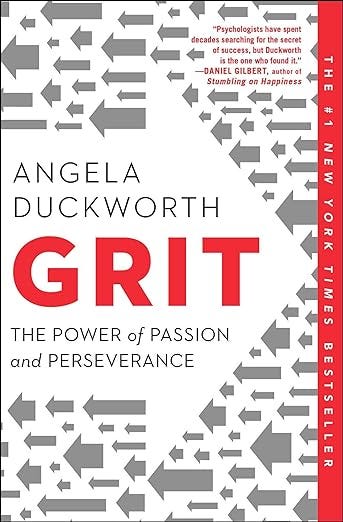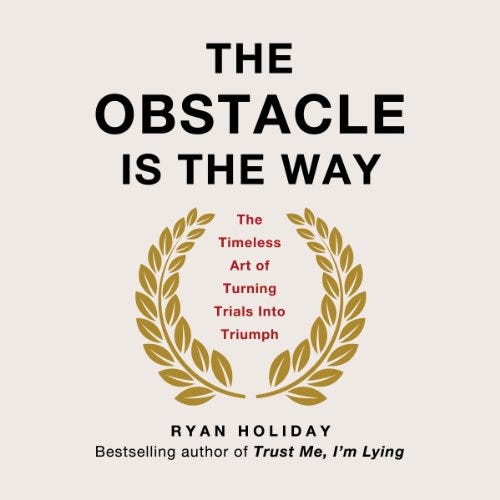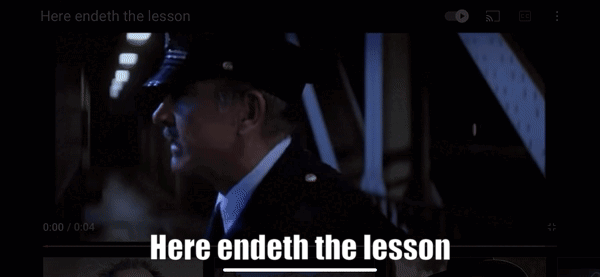Movie Life Lesson - The Pursuit of Happyness - True Grit is the Path to True Happiness
The Pursuit of Happyness is a biographical drama released in 2006, directed by Gabriele Muccino and written by Steven Conrad. The film stars Will Smith as Chris Gardner, a struggling salesman turned stockbroker, alongside Jaden Smith in his film debut as Gardner's young son, Christopher. Thandiwe Newton plays Linda, Chris’s estranged wife.
The story chronicles Gardner's journey from homelessness to success in San Francisco during the early 1980s. It’s a powerful testament to resilience, persistence, and grit. Garnering over $307 million worldwide, the film earned critical acclaim, including an Academy Award nomination for Best Actor for Will Smith.
Life Lesson: The Pursuit Requires Grit
“They all looked so damn happy. Why couldn’t I look like that?”
This line, spoken by Chris Gardner, resonates deeply. It’s a universal question. How many of us have asked ourselves that same question? Maybe it’s about your career, your relationship, your whole life. It doesn’t matter. Happiness is the thing we’re all chasing. It’s even in the Constitution, for crying out loud: Life, Liberty, and the Pursuit of Happiness. But here’s the kicker—it’s the pursuit that matters.
As Chris Gardner says:
“How did Thomas Jefferson know to put the ‘pursuit’ part in there? Maybe happiness is only something we can pursue. And we can never have it. No matter what.”
That’s the question the movie answers: what does it mean to pursue something? And why do we do it? Because we pursue the things we value. And anything worth pursuing? It’s going to take grit.
Grit is a combination of perseverance and passion for long-term goals. It’s the resilience to keep pushing forward in the face of obstacles, setbacks, and adversity, driven by a deep commitment to achieving something meaningful.
Psychologist Angela Duckworth, who popularized the concept in her book, “Grit”, defines grit as:
"Perseverance and passion for long-term goals."
It’s about:
Sustained Effort: Staying consistent and working hard over time, even when progress feels slow.
Resilience: Bouncing back from failure and setbacks without giving up.
Focus on a Goal: Remaining deeply committed to a purpose or aspiration, regardless of challenges.
Grit isn’t about talent or luck—it’s about tenacity, determination, and an unshakable belief in your ability to succeed.
Phases of the Journey: Struggle and Transformation
Chris’s journey isn’t clean. It’s messy, chaotic, and full of setbacks. In the movie he labels the different parts of his life’s pursuit.
Riding the bus: Constantly on the move, hustling to sell his bone density scanners.
Being stupid: Making mistakes, learning from them, and moving forward anyway.
Running: Literally and figuratively chasing opportunity.
Internship: The unpaid grind where he’s got to prove himself every single day.
It’s a journey that echoes what Steve Martin calls “The War Years” in his memoir Born Standing Up. Martin’s rise to fame—becoming the first “rock star comedian” playing sold-out stadiums—was built on the same foundation as Chris’s success: struggle and determination. No shortcuts, no handouts, just sheer willpower.
What were your “war years?” Are you perhaps still struggling through them? if so, what keeps you going?
Life Lesson: Protect Your Dream
One of the film’s most memorable moments comes when Chris, playing basketball with his son, realizes he’s about to discourage the boy from pursuing his dreams—just as others have discouraged him. He catches himself and says:
“You got a dream, you gotta protect it. People can’t do something themselves, they wanna tell you that you can’t do it. You want something? Go get it.”
This moment is the heart of the movie. It’s about shielding your dreams from the doubters, even when the doubter is you. Our dreams are fragile and must be guarded fiercely. It also underscores the importance of belief—in ourselves and in others.
When the Lesson Is Forgotten: Losing Sight of the Dream
Chris’s journey is full of moments when doubt creeps in—when he’s hanging on by a thread. His wife, Linda, makes her frustration clear:
“I’m not happy anymore, Chris. I’m not happy.”
His response?
“Then go get happy, Linda. But Christopher is living with me.”
It’s raw, it’s real, and it’s a pivotal moment. When Linda leaves, Chris is forced to bet everything on himself and his ability to make it through, no matter what it takes.
Building Callouses: Toughening the Mind
Chris Gardner’s journey is what Navy SEAL and endurance athlete David Goggins calls: “Callousing your mind.”
That’s the part of the process we don’t talk about enough—the rejections, the failures, the moments that break you down so you can build yourself back up. Chris lives this every day during his internship. As he puts it:
“If you ask me a question and I don’t know the answer, I’ll tell you I don’t know. But I know how to find the answer, and I’ll find it.”
That’s grit in action: not knowing everything but refusing to let that stop you.
Personal Connection: Working the Call Sheet
Chris’s relentless work ethic reminded me of my own experience working call sheets. First, as a UCLA student cold-calling alumni for donations. Then later, as an assistant at FX Network, rolling calls for two bosses who expected me to be a machine.
Want to talk about building callouses? Try cold-calling strangers to ask for money—it’s a crash course in rejection.
Chris’s approach is simple:
“X number of calls = X number of prospects = X number of customers = X number of dollars in the company’s pocket.”
It’s not glamorous, but it works. The math doesn’t lie.
Still, he works the call sheet. But because of his parental responsibilities—leaving every day at 3 p.m. while others in the program stay late—he can’t get through the entire list. To make up for lost time, Chris imposes strict rules on himself: he doesn’t hang up between cold calls and avoids drinking water to skip bathroom breaks. Even so, he struggles to keep up.
This is when Chris begins to play by his own rules—not as shortcuts, having learned the hard lessons of doing so, but by adapting the process to fit his life. Instead of calling every name on the list, he skips to the top and calls the CEO of a pension fund, landing a meeting. However, after being asked by his internship manager to move his car to avoid a parking ticket, Chris misses the meeting—and ironically ends up with a ticket of his own. Life, it seems, isn’t fair.
Despite this and countless other setbacks, with every reason to be angry or wallow in self-pity, Chris doesn’t falter. He stays determined—and he’s learning. In the next scene, we see him paying the parking ticket while at dinner with his son, sacrificing his own meal in the process.
This scene, subtle but significant, illuminates Chris’s growth. He’s learning which rules to follow and which to bend. He pays the ticket to avoid ending up in jail with his car impounded again, as happened earlier in the movie. But he also doesn’t give up on the meeting with the CEO, eventually rescheduling it. Though that meeting doesn’t yield the outcome he hoped for, it opens other doors—most notably, the business cards of other executives at the fund. These connections become valuable leads for his future sales calls.
Ryan Holiday, in his book, “The Obstacle Is The Way” points out that many of history’s most successful people found their path to success via the obstacles that at first glance, seemed to be standing in the way of that success.
Are there times on your own journey where setbacks were actually opportunities in disguise? Leave me a comment about some time you turned an obstacle into an opportunity.
“This part of my life, this little part, is called ‘happiness.’”
The last part of Chris’s journey comes when chris gets the job.
The Moment of Happiness
After everything—the long nights, the missed chances, the sheer grind of trying to make something out of nothing—Chris finally gets the moment he’s been fighting for. He’s called into the office at Dean Witter, his nerves barely contained as he sits across from the manager. And then, almost offhandedly, they tell him: he got the job. It’s quiet. It’s simple. And it’s devastating in the best way. Chris walks out into the streets of San Francisco, tears in his eyes, blending into the crowd like any other person.
As he says in the voiceover: “this little part, this little part right here, is called ‘happiness.’”
It’s a poignant reminder that happiness isn’t a permanent state of being — it isn’t even a big part of his life, it isn’t about grand gestures or easy wins—it’s about the triumph that comes from grit, resilience, and staying in the fight, until finally we earn that thing which we pursued, which we sacrificed so much to achieve.
Like what you see? Become a paying subscriber and get even more exclusive content. Thanks to your support I get to bring you the very best Movie Life Lessons — because your story deserves a great ending.






